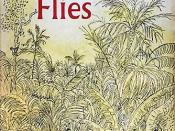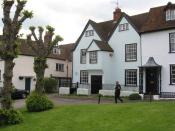All of man will destroy itself. Proving this is William Golding's purpose in writing "The Lord of the Flies", a story about a group of boys stranded on a deserted island. When the boy's priorities clash, a war breaks out between protagonist Ralph and shortsighted antagonist Jack, who instead of being rescued would rather hunt. The fight for power between them soon turns to violence. Golding uses these boys as a scaled down model of what the world is like at war. Golding uses symbolism diction and allegory in "The Lord of the Flies" to prove that man, not natural causes, will lead to his own demise.
Symbolism is the most prevalent supporter of Golding's purpose in "The Lord of the Flies". The character of "The lord of the Flies", which is actually only a pigs head impaled on a stick sharpened at both ends is representative of the devil as shown in the quote "The Lord of the Flies" is a translation of the Hebrew [Beelzebub]...suggested
name for the devil (Golding, 205). This quote, coming from the notes section in the back of the text gives a good example of symbolism in directly stating the name of the character and title of the book are actually a name for the devil. Another character in the book is Simon, the opposite of the pig's head; he is the Christ figure in the book. "Simon, an embryo mystic...fights with all his feeble power against the message of...the human capacities for evil...the knowledge of the end of innocence" (Golding, 207). Christ's realization of sins power drove him to death. The same is true for Simon. "The Lord of the Flies" opens Simon's eyes to the flaw of human immorality and this...


